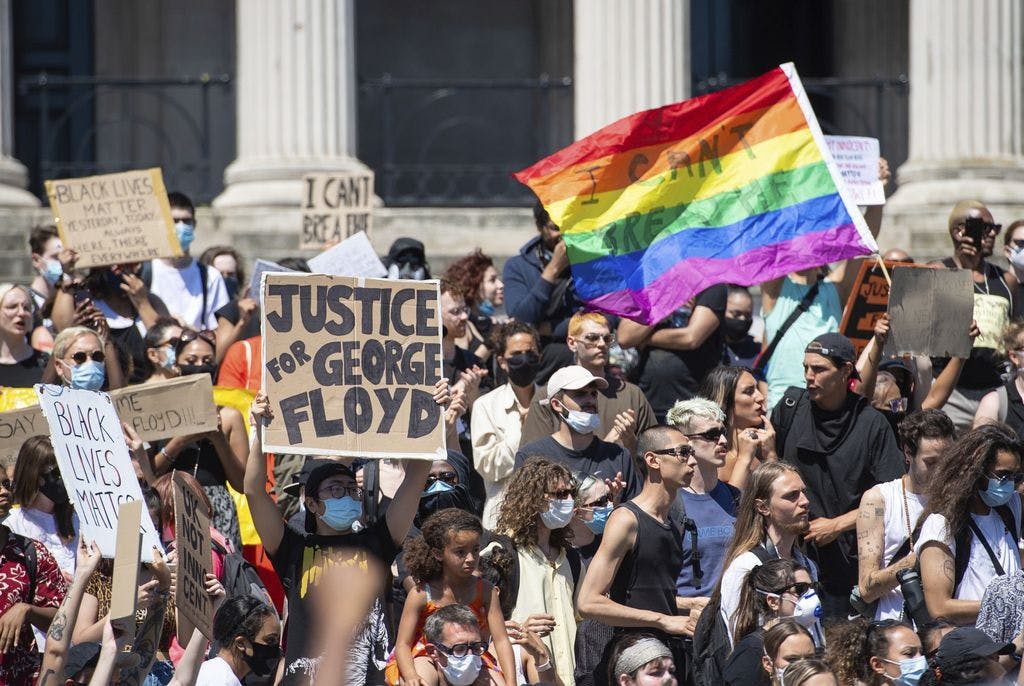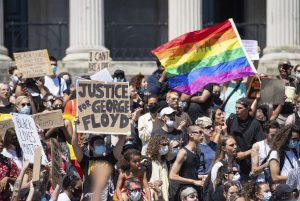

Press
Police brutality in America has led to many discussions on how to end the ongoing mistreatment of Black people, along with the history of race relations that suppress them and other people of color. In his lecture, “Race, Violence, and Power,” BC Philosophy adjunct professor Kobie Colemon makes the case that counter-violence, or the self-defense of oppressed communities, is a confrontation that will permanently overthrow the “massive domination” that is systemic racial injustice.
“I think it’s unrealistic for anyone to assume that massive domination, injustice, inequality, will not someday produce a counter-force sufficient for its overthrow,” said Colemon. “Historically, this has never not been true, right?”
In his lecture, Colemon points out the spirit of the American Revolution that fueled a violent overthrow of the British empire in the name of liberty and independence. He also describes “lesser-known rebellions,” such as the Haitian Revolution of 1791, that have “developed the African diaspora.” These acts of violence carried out by the oppressed against their oppressors are representative of counter-violence.
Violence is often defined vaguely as an inflection of harm, which fails to recognize it’s potential connection to power. As Colemon puts it, violence is rooted in the “ongoing, normalized social practices, organized by power relations.” Violence and power can go hand and hand; once one recognizes this relationship, Colemon argues that one can begin to see that different forms of violence can be “a buttress to power.” To know the moral quality of violent acts, or how justifiable they are, one must evaluate society’s reactions.
“The way I see it, we have a far too simple idea of violence. We need qualitative distinctions that go with different kinds of social relations and different kinds of historical processes,” said Colemon.
Colemon defines three umbrellas of violence: isolation, conventional, and emancipatory counter-violence. Throughout his discussion of police brutality, he focused on the prevalence of conventional violence, or the practice of conformity to institutional power, and his advocacy for the rebellious spirit of counter-violence. In narrowing his explanation of these distinct terms of violence, Colemon defined which acts of harm are justifiable and which are not.
Using the murder of George Floyd, a Black man who was killed last May by Minneapolis police, Colemon described the unjust violence of the officer who caused Floyd’s death as conventional violence.
“We can admit that it’s not a group of flawed individuals who happen to be police officers from one department to another, upon city, upon city, upon city, who are putting Black people at the risk of death,” said Colemon. “Rather, it’s easy to see there’s an institutional bias in place where Black people are profiled by the police and targeted for harassment and arrest. If you resist or at least pretend that you are resisting, then you are targeted for murder.”
Ultimately, Colemon argues, the institutional ideas are learned by officers as a result of the racial injustice that is rooted in America’s history of slave catching and bounty hunting. Counter-violence against these interconnected acts of conventional violence can be exhibited by the oppressed Black community who cannot depend on the rule of law to “assert or protect their interest.”
“Political power, for instance, is bundled up in a state restricted or at best administered in very small doses to individuals or groups who demonstrate an affinity that serves states’ interests. Even if it’s against their own interests,” said Colemon.
As Colemon argues, it is imperative to observe that the most appropriate method of evaluating social change is understanding that acts of racial injustices have historic records. In persuing the permanent end of systemic racial discrimination, four different possibilites centered on violence are likely to occur. The first is unjust nonviolence, which defines the passivity or submission to oppression; on the other hand, unjust violence is a contingent reinforcement of oppression against identifiable constituencies like policing. Thirdly, just nonviolence is a direct form of counter-violence that is passive in nature; it’s counterpart, just violence is the means of self-defense.
As the discussion for eradicating police brutality continues, understanding the precedents of such violence and abuse of power has become a necessity to develop social change.
“In the wake of the continued violence against Black men and people of color, the persistent and endemic racism in our country, we are all in desperate need to hear from informed voices that can speak on these important issues, and provide us with tools of reflection, understanding, and change,” said Robert Lurz, Chair of the Brooklyn College Philosophy Department.
